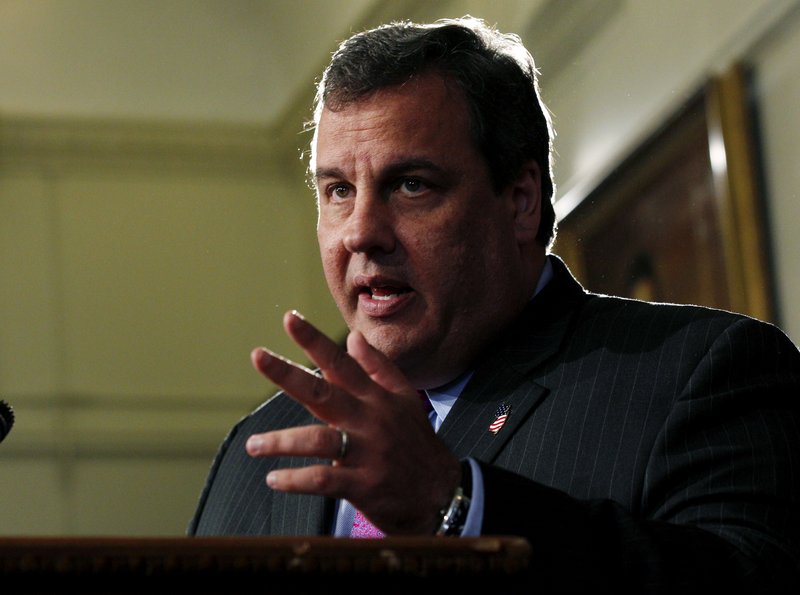The political world was shocked and dismayed to discover that Chris Christie is not running for president.
Presumably this is because the New Jersey governor dropped so many hints about joining the race for the Republican nomination.
Such as this one from last year: “Short of suicide, I don’t really know what I’d have to do to convince you people that I’m not running. I’m not running!”
The tease!
And this one in February: “What do I have to do short of suicide to convince people I’m not running? Apparently, I actually have to commit suicide to convince people I’m not running.”
The incorrigible flirt!
Christie even made his case to late-night comedians. “You might run for president?” Jimmy Fallon asked in November.
“No chance,” the governor replied.
“No chance?”
“No chance.”
Heedless of the disavowals, the media continued to puff up the Christie candidacy, aided by establishment Republicans eager to have the governor in the race. But when Christie went before the cameras Tuesday afternoon in Trenton, it was clear that, for all the frenzy, it had never been a real possibility.
“No matter how many times I was asked the question, for me the answer was never anything but no,” Christie pointed out, accurately. While he said he weighed “earnestly” the pleas for him to run, “In the end, what I’ve always felt was the right decision remains the right decision today. Now is not my time.”
A reporter asked Christie why he thought “the drum beats have gotten louder.”
“You’d have to ask the people who were beating the drums,” the non-candidate answered.
Good idea. Christie emerges from this extended national period of ego-stroking with his stature enhanced by the pervasive, and baseless, speculation. The same cannot be said of the Republicans who peddled the Christie non-story and the journalists who took their hype seriously.
For Republicans, the draft-Christie effort once again exposed their displeasure with the field of candidates. In a new Washington Post-ABC News poll, only 9 percent of Republicans were very pleased with the slate of candidates, compared with 19 percent in September 2007.
By 42 percent to 34 percent, would-be Republican voters wanted Christie in the race. Though not a candidate, Christie polled just behind a trio of flawed candidates: Mitt Romney (Romneycare), Herman Cain (pizza guy) and Rick Perry (imploding). The lack of a compelling nominee explains why a majority of Americans expect a Republican to beat Obama but when individual Republican candidates are matched against Obama, the president prevails.
If Republicans look desperate, reporters look gullible. “After months of hedging, New Jersey Gov. Chris Christie is giving serious thought to jumping into the ring,” the New York Post trumpeted on Sept. 29, two days after Christie’s brother told The Newark Star-Ledger the exact opposite. The inimitable Michael Kinsley disqualified Christie for being “just too fat,” and talk-show host Jimmy Kimmel speculated that the governor could be induced to run with a bucket of fried chicken.
This backdrop of weirdness allowed Christie to display his main political assets: acting normal and talking plain. He gave short, relevant answers and kept rubbing his nose in a way not favored by political consultants. He bantered with the local reporters and joked about the people who tried to persuade him to run (“obviously they weren’t that good”).
The very public courtship left Christie with a plus-size ego. He called himself “something special,” bragging about the “great things” he’s doing and claiming he “knew” he could win. He almost choked up when he spoke of all the people who told him they would miss him as governor.
But he also, perhaps inadvertently, showed why he didn’t belong in the race. Christie revealed himself to be the rare Republican who still quotes Abraham Lincoln. And he was painfully undisciplined, standing for an exhausting 50 minutes to answer variations of the same question.
“I know it’s your guys’ job to ask me this question like, you know, a dozen different ways, and I’ll answer it almost a dozen different ways, which infuriates my staff,” he said.
Still, he kept answering. “It’s a no until it’s a yes,” he pleaded. “The no never changed.” To another questioner, he said: “All you people showed up today and I get to have this press conference, but nothing’s changed.”
His refusals were refused. A reporter asked him why he might not reconsider in three months, six months or a year. “Because I said no,” the governor answered.
Will the man never stop dropping hints?
Dana Milbank is a columnist for The Washington Post Writers Group. He can be contacted at: danamilbank@washpost.com
Send questions/comments to the editors.



Success. Please wait for the page to reload. If the page does not reload within 5 seconds, please refresh the page.
Enter your email and password to access comments.
Hi, to comment on stories you must . This profile is in addition to your subscription and website login.
Already have a commenting profile? .
Invalid username/password.
Please check your email to confirm and complete your registration.
Only subscribers are eligible to post comments. Please subscribe or login first for digital access. Here’s why.
Use the form below to reset your password. When you've submitted your account email, we will send an email with a reset code.